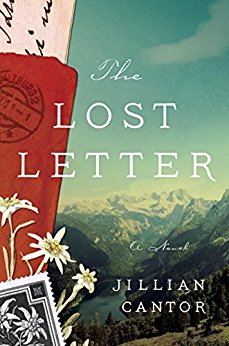
Q&A with Author of “The Lost Letter”
Q. In what ways does Katie’s experience tracking down the story of the stamp change who she is in the story?
Katie was raised Jewish but married a Christian man, whom she’s in the process of divorcing as the story opens. She’s also dealing with her father losing his memory. So, she’s floundering a bit in her identity. Discovering the history of the stamp makes her rethink what it means to be a woman and a Jew living in her own time. In the beginning of the novel she’s lost touch with her religion, but by the end she rethinks its importance in her life. Also, the more she learns about Kristoff and Elena, the more she understands how lucky she is to have been born where and when she was, and that definitely affects how she views her world and her own choices.
Q. There are two romances in The Lost Letter, each blooming in a different era. How did these two settings affect how you portrayed each romance?
Part of what I wanted to explore when I was writing was how ordinary people live their lives in extraordinary circumstances. In the 1938 story, there’s the Nazi occupation of Austria, Kristallnacht, and the impending war, In the 1989 story, the characters live in America and are free to make their own choices, but they’re deeply affected by personal tragedy.
In both settings I was trying to explore the question of how you can fall in love amid chaos, uncertainty and tragedy, both large and overwhelming and small and personal.
Q. Katie relentlessly pursues the origin of a stamp in her father’s collection right as she is losing him to Alzheimer’s. What did she hope to gain in her relationship with her father by solving the mystery of this stamp?
I lost my own grandmother to Alzheimer’s a few years before I wrote this book, so I was really interested in writing a novel about memory and loss and the things that remain even as people we love begin to lose everything they remember. In the novel, Katie never understood her father’s obsession with collecting stamps as she was growing up, but he always told her he was looking for a “gem.” So she equates finding his “gem” with understanding him, in a way. And this stamp is also a tangible piece of his life, his interests, even as so much of him is disappearing in front of her.
Q. The idea of a Jew trying to resist the Nazis, as Frederick Faber’s daughter Elena does, is painful to read about. Did writing about characters living under—and resisting—Nazi oppression affect you personally?
It was actually both painful and empowering to write them. Elena is so tough, and she refuses to stop fighting no matter how dangerous it is for her. It felt really great to write a character who is such a fighter, who keeps on resisting no matter what. But also it was painful to write.
The views and opinions expressed in this article are the author’s own and do not necessarily reflect those of Lilith Magazine.



